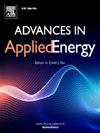Pathways to sustainable fuel design from a probabilistic deep learning perspective
IF 13.8
Q1 ENERGY & FUELS
引用次数: 0
Abstract
To achieve net zero CO2 emissions by 2050–2060, decarbonising the hard-to-abate sectors such as long-distance, heavy-duty transport is a top priority worldwide. These sectors are particularly challenging to decarbonise due to the use of high-energy-density liquid fossil fuels. In this context, designing low-carbon alternative fuels compatible with existing engines and fuel infrastructures is essential. This work presents an advanced fuel design framework to develop sustainable fuels that meet the high energy density requirements of heavy-duty vehicles. The fuel design approach is built upon a probabilistic perspective by considering a conditional generative model to predict the physicochemical properties of pure compounds and fuel blends with confidence bounds required for decision-making tasks. The probabilistic model is then integrated into an inverse design framework to design fuels with specific requirements. Finally, the fuel design framework is employed to develop new diesel fuel compositions according to the desired targets: ignition quality (cetane number) and sooting tendency (yielding sooting index). The AI-assisted fuel design approach can potentially lead to sustainable liquid fuels that are fully compatible with the existing utilisation equipment and can satisfy the requirements of different application sectors.
从概率深度学习的角度看可持续燃料设计的途径
为了在2050-2060年之前实现二氧化碳净零排放,对长途、重型运输等难以减排的行业进行脱碳是全球的首要任务。由于使用高能量密度的液体化石燃料,这些部门在脱碳方面尤其具有挑战性。在这种情况下,设计与现有发动机和燃料基础设施兼容的低碳替代燃料至关重要。这项工作提出了一种先进的燃料设计框架,用于开发满足重型车辆高能量密度要求的可持续燃料。燃料设计方法建立在概率的角度上,通过考虑条件生成模型来预测纯化合物和燃料混合物的物理化学性质,并具有决策任务所需的置信限。然后将概率模型集成到逆设计框架中,以设计具有特定要求的燃料。最后,根据点火质量(十六烷值)和烟尘倾向性(产生烟尘指数)这两个目标,利用燃料设计框架开发新的柴油成分。人工智能辅助燃料设计方法可能会产生与现有利用设备完全兼容的可持续液体燃料,并能满足不同应用领域的要求。
本文章由计算机程序翻译,如有差异,请以英文原文为准。
求助全文
约1分钟内获得全文
求助全文

 求助内容:
求助内容: 应助结果提醒方式:
应助结果提醒方式:


